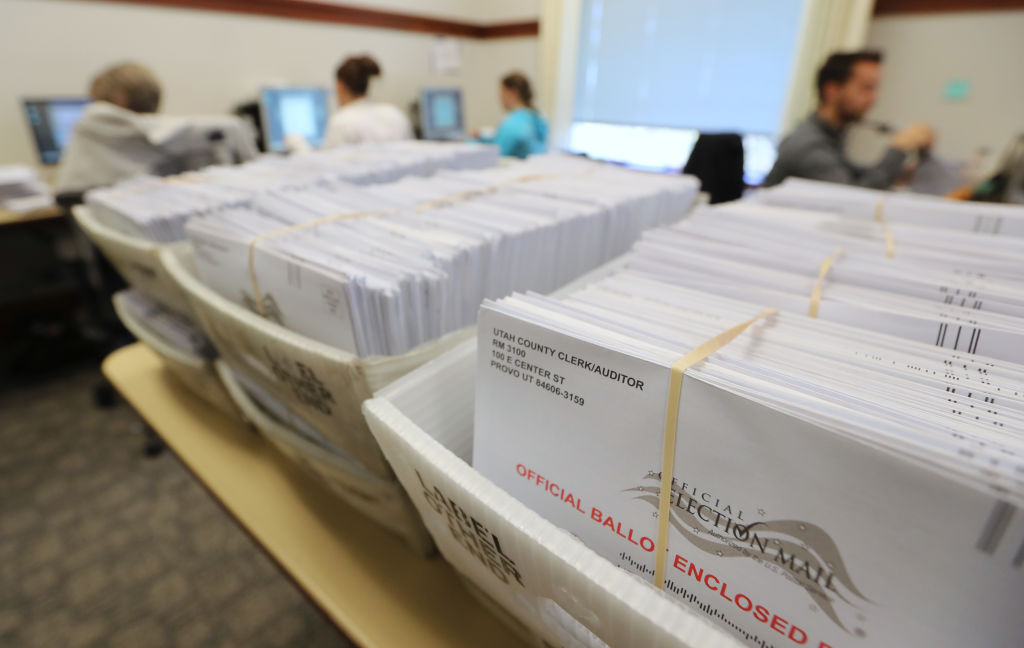The Democratic former mayor of an Arizona city pleaded guilty last week to engaging in illegal ballot harvesting during the 2020 primary election, adding credence to claims the same conduct occurred during the general election.
According to The Associated Press, Guillermina Fuentes, 66, operated a “sophisticated operation” in San Luis, a border city of approximately 33,000 people located in Yuma County.
“Fuentes and a second woman were indicted in December 2020 on one count of ballot abuse, a practice commonly known as ‘ballot harvesting’ that was made illegal under a 2016 state law,” the AP reported.
She pleaded guilty on Thursday.
Fuentes and her co-defendant were videotaped by a write-in candidate delivering several mail-in ballot envelopes to the cultural center in San Luis, where they were deposited in a ballot drop dox.
The write-in candidate reported the delivery to the Yuma County sheriff, who then launched an investigation.
Days later, the Arizona attorney general’s office took over the criminal probe, interviewing several voters.
The AP learned through documents obtained from a public records request that investigators were only able to link Fuentes to about a dozen ballots.
However, the report states, “investigators believe the effort went much farther.”
“Attorney general’s office investigator William Kluth wrote in one report that there was some evidence suggesting Fuentes actively canvassed San Luis neighborhoods and collected ballots, in some cases paying for them,” the AP noted.
The Arizona Republic reported last week that the AG’s office served a search warrant on an employee of the Arizona nonprofit Comité de Bien Estar who also holds political office in San Luis.
That report cited Marco “Tony” Reyes, a Democrat and chairman of the Yuma County Board of Supervisors, who claims Attorney General Mark Brnovich, a Republican, is pursuing the case for political profit.
“The search warrant, which Reyes shared photos of with The Arizona Republic, allowed officers to confiscate the phone and search the home of the employee, Gloria Torres, who also is a member of the San Luis City Council,” the Republic reported.
This potential illegal actively squares with the information contained in the Dinesh D’Souza, True the Vote documentary film “2000 Mules” released last month.
The central premise of the movie is that an illegal ballot harvesting scheme took place in the key swing states of Arizona, Georgia, Pennsylvania, Michigan and Wisconsin during the 2020 general election.
“Mule” is a term used in the movie for those who repeatedly picked up batches of ballots and placed them in drop boxes.
The vote integrity organization True the Vote said it used cellphone geotracking data to identify individuals who went to 10 or more drop boxes and five or more visits to nongovernmental organizations working on voter turnout during the 2020 general election.
In the film, an informant from San Luis, whose identity was hidden, detailed how she participated in the undertaking.
She told True the Vote’s Gregg Phillips how mules would drop off ballots and come in for what she assumed were weekly payments during the election.
“I would get a call to find out how many ballots were brought in and if they were already pre-filled out first,” the informant said.
A woman “would come to the office, look at them. And then before she left, she would either take them herself, but other times she would ask me to drop them off at the library,” the informant said.
The informant was told to go to that particular drop box because there were no surveillance cameras there.
The woman “wanted me to take it in the evening when it was dark, also,” according to the informant.
She put hundreds of ballots in the drop box herself, the informant told Phillips.
Catherine Engelbrecht, founder of True the Vote, said in “2,000 Mules” that the informant was cooperating with authorities.
The average number of trips per mule in Yuma County was 31, according to Engelbrecht.
She testified before a group of Republican Arizona state senators last week at the capitol in Phoenix that group’s investigation identified 41 likely mules in Yuma County and 202 in Maricopa County.
Despite its reporting on two guilty pleas in Yuma County, the AP branded Phillips and Engelbrecht as “conspiracy theorists.”
The AP reporter went on to cite the AP’s own fact check from May 3 that claimed True the Vote’s analysis was “flawed” based on false assumptions of how precise cellphone tracking data is and other reasons individuals might frequently happen to go by drop boxes, or others who had business being there such as election workers.
At the May 31 Senate hearing, Phillips characterized these reporters who cast doubt on the accuracy of cellphone cell geotracking data as “journalist terrorists.”
In a Twitter post, D’Souza called out AP “fact checker” Ali Swenson and The Washington Post’s Philip Bump, in light of the guilty pleading in Yuma County.
This is for all the bogus “fact checkers” like Philip Bump and Ali Swenson who assured us that the ballot trafficking depicted in “2000 Mules” is perfectly legal.
Records show coordinated Arizona ballot collection scheme | AP News https://t.co/dlzXQkd9jP
— Dinesh D’Souza (@DineshDSouza) June 2, 2022
Fuentes faces up to two years in prison. Her sentencing hearing is set for June 30.
How does the old saying go? What’s the difference between a conspiracy theory and the truth? About six months.
Obviously, that is not always the case; some conspiracy theories are just conspiracy theories.
But the evidence that an illegal ballot harvesting scheme took place in 2020 is mounting.
This article appeared originally on The Western Journal.

























 Continue with Google
Continue with Google